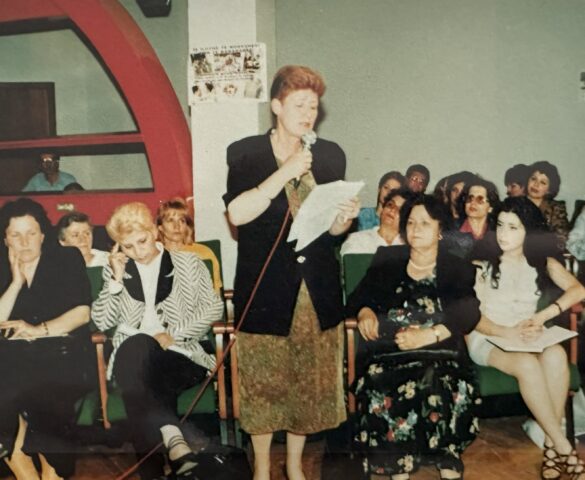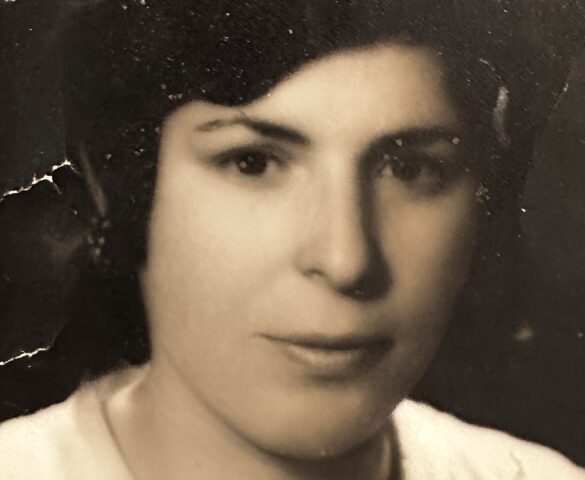I was four years old when my mother passed away. And this is… I’ve written a book Rrënjët e familjes (The Roots of the Family), where my grandfather is the main character. I suspect that a Serbian activist killed my mother. My mother was killed. I only remember the blood {touches her stomach}, a pillow, because they would remove us from the room. My father quickly rode a horse to the city and brought a doctor. […] I suspect she was killed, they threw a bomb into the chimney, at the fireplace where they used to cook.
[…] And when they came to take our wheat and corn, this Serbian woman entered the granary, and they took the wheat, but also the granary and the corn. And my mother grabbed an axe and, standing at the granary door with the axe, said, ‘As long as I’m alive, you’ll never leave here alive, because you’ve already taken the flour and the wheat, and now you want the corn too, leaving my children without bread.’
She [the Serbian woman] got very scared and told my father, ‘Take your wife away from here, I give you my word that I won’t take a single grain of corn.’ And my father somehow signaled my mother, as he later told me, and said, ‘Go, go to the house because the children are crying, or the bread might be burning.’ As soon as she left, the Serbian woman came out and ran away. However, she knew the entire layout of our house. And I believe that… because in ‘50 my mother was killed. She [the Serbian woman] threw a bomb, as my mother and the stepmother were there. The stepmother was slightly injured, but my mother was severely injured and died because of it.
The former political prisoners in Kosovo during the Yugoslav period were mostly charged for irredentist and nationalist activities, and considered internal enemies of Yugoslavia. They were identified as Ilegalja, a blanket term for the underground groups organised in threes. The movement still remains obscure due to their form of activism that acted in secret. The political legacy of Ilegalja is discussed within different historical contexts. Contradicting narratives about this movement calls for new ways of mediating this difficult-to-approach heritage.
Hanëmshahe Ilazi
Political activistHanëmshahe Ilazi
Political activistI was four years old when my mother passed away. And this is… I’ve written a book Rrënjët e familjes (The Roots of the Family), where my grandfather is the main character. I suspect that a Serbian activist killed my mother. My mother was killed. I only remember the blood {touches her stomach}, a pillow, because they would remove us from the room. My father quickly rode a horse to the city and brought a doctor. […] I suspect she was killed, they threw a bomb into the chimney, at the fireplace where they used to cook. […] And when they came to take our wheat and corn, this Serbian woman entered the granary, and they took the wheat, but also the granary and the corn. And my mother grabbed an axe and, standing at the granary door with the axe, said, ‘As long as I’m alive, you’ll never leave here alive, because you’ve already taken the flour and the wheat, and now you want the corn too, leaving my children without bread.’ She [the Serbian woman] got very scared and told my father, ‘Take your wife away from here, I give you my word that I won’t take a single grain of corn.’ And my father somehow signaled my mother, as he later told me, and said, ‘Go, go to the house because the children are crying, or the bread might be burning.’ As soon as she left, the Serbian woman came out and ran away. However, she knew the entire layout of our house. And I believe that… because in ‘50 my mother was killed. She [the Serbian woman] threw a bomb, as my mother and the stepmother were there. The stepmother was slightly injured, but my mother was severely injured and died because of it.
Shazije Gërguri Hasangjekaj
ActivistIn ‘65, at the end of ‘64. Adem Demaçi was on trial, I took some friends with me. I didn’t take them to organize something, because I didn’t have the power to organize anything. I said, ‘Does anyone want to come with me? I’m going to watch Adem’s trial.’ I know I went with Elhame.
[…] And Mejrem [Berisha-Sema] was there, actually I don’t know if Mejrem was with me that day. Because Mejrem was a great activist. The next day at around 4:00 in the morning, a police car appeared in front of our door. Bam, bam, bam {onomatopoeia} to tell you the truth, I was very scared. Because we were traumatized by [what had happened with] my brother, they took him away around the same time. They would come and make our house a mess. And they said to me, ‘Get dressed and come with us.’ I didn’t remember anything. Who could have betrayed me, no one because no one knew, hardly anyone knew.
I went, they put me in jail. They kept me for two days. They fired me without any documents or anything. I didn’t even dare to ask why I was here. But I thought maybe they wouldn’t do anything if I asked as I was leaving. I said, ‘Excuse me, why was I here?’ They said, ‘You had intentions of organizing a protest because Adem Demaçi is on trial.’ They gave me some paper to sign, who dared to read what they were signing. I signed it and only God knows what I signed (laughs).


